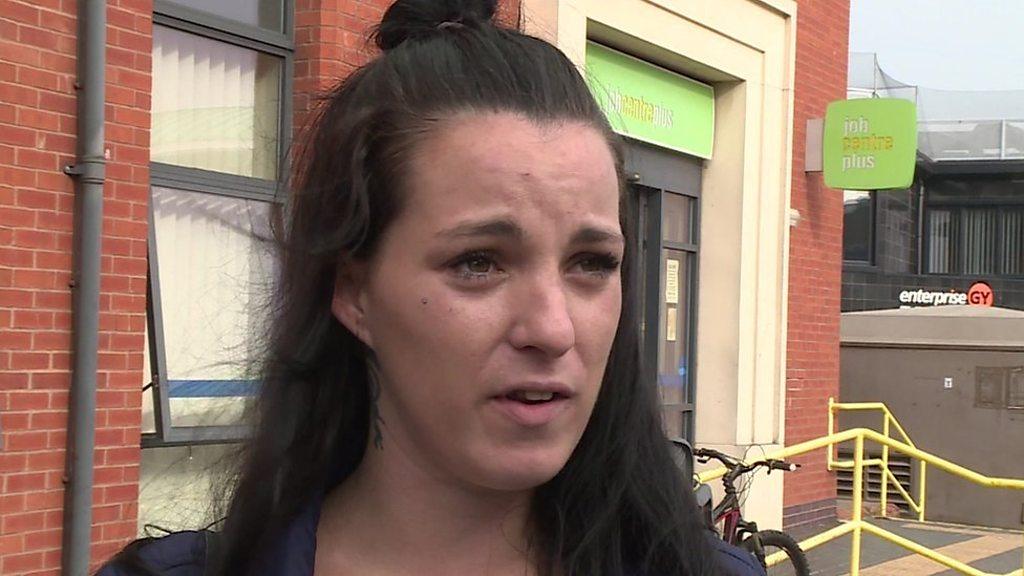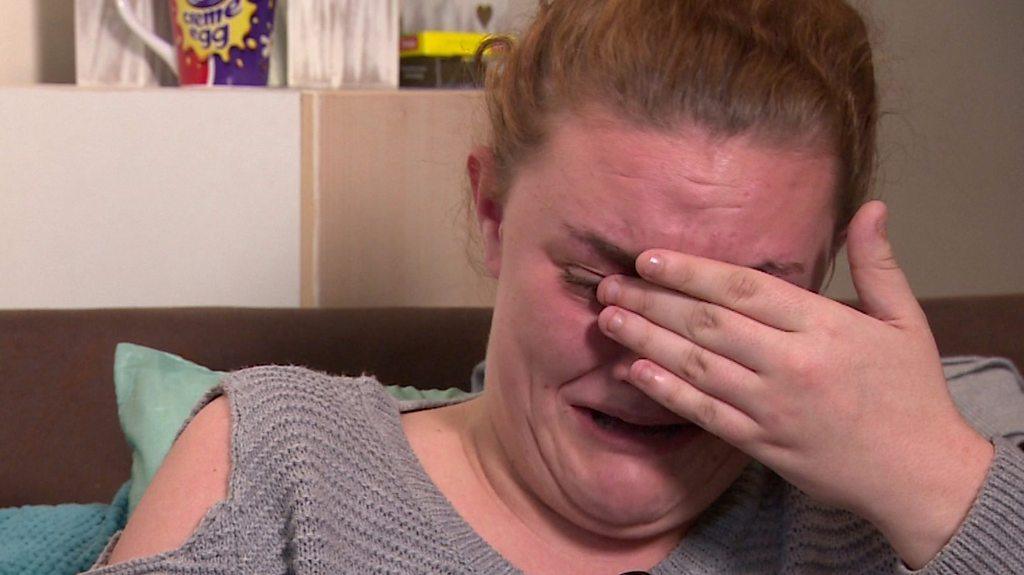Theresa May to scrap universal credit helpline charges
- Published
- comments
Speaking in September 2017, claimants told the BBC about the problems they faced
People will be able to call the government's universal credit helpline without being charged, within weeks.
Prime Minister Theresa May said she had listened to criticism of the charges, which can be up to 55p a minute, and decided it was "right" to drop them.
But she again rejected calls by Labour leader Jeremy Corbyn to "pause" the roll-out of the controversial benefit amid fears it is causing hardship.
In a symbolic vote, MPs backed a pause after Tory MPs were told to abstain.
The opposition won by 299 votes to 0 with one Conservative - Totnes MP Sarah Wollaston - defying her party by siding with Labour.
The outcome is not binding on the government although Labour leader Jeremy Corbyn said ministers must "act on the clearly expressed will of Parliament" and halt its roll out.
Commons Speaker John Bercow advised ministers to take account of the vote and "show respect for the institution" by indicating what they intended to do.
'Simpler system'
Universal credit, which rolls six working-age benefits into a single payment, is designed to make the system simpler and ensure no-one faces a situation where they would be better off claiming benefits than working.
But it has faced a backlash from Tory MPs, who fear payment delays risk pushing families into destitution.
Explaining her decision to rebel, Dr Wollaston said the length of time people were waiting to be paid - in many cases more than six weeks - was a "fundamental flaw" that must be addressed.
She told the BBC she wanted to "see a much stronger commitment" from government "that they'll do that immediately".
At Prime Minister's Questions earlier, Mr Corbyn said he was glad the PM had "bowed to Labour pressure" by scrapping the hotline charges.
Speaker: Don't pretend you didn't lose
But he added: "The fundamental problems of universal credit remain - the six week wait, rising indebtedness, rent arrears and evictions.
"Will the prime minister now pause universal credit and fix the problems before pressing ahead with the roll-out?"
Mrs May prompted cheers from Labour MPs as she began her reply with "yes", before urging them to "listen to the whole sentence I was going to make".
She said universal credit was "a simpler system", that "encourages people to get into the workplace - it is a system that is working because more people are getting into work".
The universal credit hotline will become free to use "over the next month", the government has said, and that would be followed by all DWP helplines by the end of the year.
The government says it makes no money from the 0345 number. It is charged at local rate and is included as a free call in many landline and mobile phone packages but can cost some mobile phone users as much as 55p a minute.
Universal Credit has been introduced in stages to different groups of claimants over the past four years, with about 610,000 people now receiving it.
Almost a quarter of all claimants have had to wait more than six weeks to receive their first payment in full because of errors and problems evidencing claims.
But the government recently approved a major extension of the programme to a further 45 job centres across the country, with another 50 to be added each month.
The PM appears to give a surprising initial answer when asked to pause the national rollout of universal credit.
Labour's Frank Field told MPs a food bank in his Birkenhead constituency needed to order five tonnes of extra food to deal with hardship caused by the roll-out of universal credit over Christmas.
He asked Work and Pensions Secretary David Gauke if his constituents should ignore the food bank's warnings, or give it extra donations as a result of the minister's "inability to deliver a scheme that works".
'Pious loan shark'
Mr Gauke had earlier accused Labour of attempting to wreck the new benefit rather than taking a constructive approach to reforming it.
The SNP's Mhairi Black said the offer of advance payments made matters worse for some claimants because they had to be paid back.
She accused the government of acting like a "pious loan shark - except that instead of coming through your front door they are coming after your mental health, your physical well-being, your stability, your sense of security."
The Department for Work and Pensions says its latest data, from last month, indicates 81% of new claimants were paid in full and on time at the end of their first assessment while 89% received some payment.
BBC Newsnight's political editor Nick Watt said he understood ministers were giving "serious thought" to cutting the initial waiting period for payments from six to four weeks around the time of next month's Budget.
- Published13 May 2024

- Published29 September 2017

- Published12 October 2017

- Published29 September 2017

- Published2 October 2017
